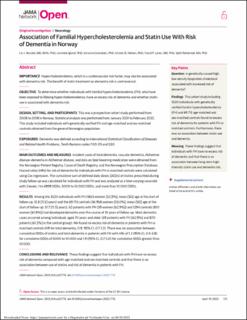Association of familial hypercholesterolemia and statin use with risk of dementia in Norway
Mundal, Liv; Igland, Jannicke; Svendsen, Karianne; Holven, Kirsten Bjørklund; Leren, Trond Paul; Retterstøl, Kjetil
Peer reviewed, Journal article
Published version

View/
Date
2022Metadata
Show full item recordCollections
- Import fra CRIStin [3604]
- Institutt for helse- og omsorgsvitskap [2776]
Original version
Mundal, L. J., Igland, J., Svendsen, K., Holven, K. B., Leren, T. P., & Retterstøl, K. (2022). Association of familial hypercholesterolemia and statin use with risk of dementia in norway. JAMA Network Open, 5(4). 10.1001/jamanetworkopen.2022.7715Abstract
Importance Hypercholesterolemia, which is a cardiovascular risk factor, may also be associated with dementia risk. The benefit of statin treatment on dementia risk is controversial.
Objective To determine whether individuals with familial hypercholesterolemia (FH), who have been exposed to lifelong hypercholesterolemia, have an excess risk of dementia and whether statin use is associated with dementia risk.
Design, Setting, and Participants This was a prospective cohort study performed from 2008 to 2018 in Norway. Statistical analysis was performed from January 2021 to February 2022. This study included individuals with genetically verified FH and age-matched and sex-matched controls obtained from the general Norwegian population.
Exposures Dementia was defined according to International Statistical Classification of Diseases and Related Health Problems, Tenth Revision codes F00-03 and G30.
Main Outcomes and Measures Incident cases of total dementia, vascular dementia, Alzheimer disease–dementia in Alzheimer disease, and data on lipid-lowering medication were obtained from the Norwegian Patient Registry, Cause of Death Registry, and the Norwegian Prescription Database. Hazard ratios (HRs) for risk of dementia for individuals with FH vs matched controls were calculated using Cox regression. The cumulative sum of defined daily doses (DDDs) of statins prescribed during study follow-up was calculated for individuals with FH and was analyzed as a time-varying covariate with 3 levels: 1 to 4999 DDDs, 5000 to 10 000 DDDs, and more than 10 000 DDDs.
Results Among the 3520 individuals with FH (1863 women [52.9%]; mean [SD] age at the start of follow-up, 51.8 [11.5] years) and the 69 713 controls (36 958 women [53.0%]; mean [SD] age at the start of follow-up, 51.7 [11.5] years), 62 patients with FH (39 women [62.9%]) and 1294 controls (801 women [61.9%]) had developed dementia over the course of 10 years of follow-up. Most dementia cases occurred among individuals aged 70 years and older (39 patients with FH [62.9%] and 870 patients [67.2%] in the control group). We found no excess risk of dementia in patients with FH vs matched controls (HR for total dementia, 0.9; 95% CI, 0.7-1.2). There was no association between cumulative DDDs of statins and total dementia in patients with FH with HRs of 1.2 (95% CI, 0.4-3.8) for cumulative DDDs of 5000 to 10 000 and 1.9 (95% CI, 0.7-5.0) for cumulative DDDs greater than 10 000.
Conclusions and Relevance These findings suggest that individuals with FH have no excess risk of dementia compared with age-matched and sex-matched controls and that there is no association between use of statins and risk of dementia in patients with FH.
